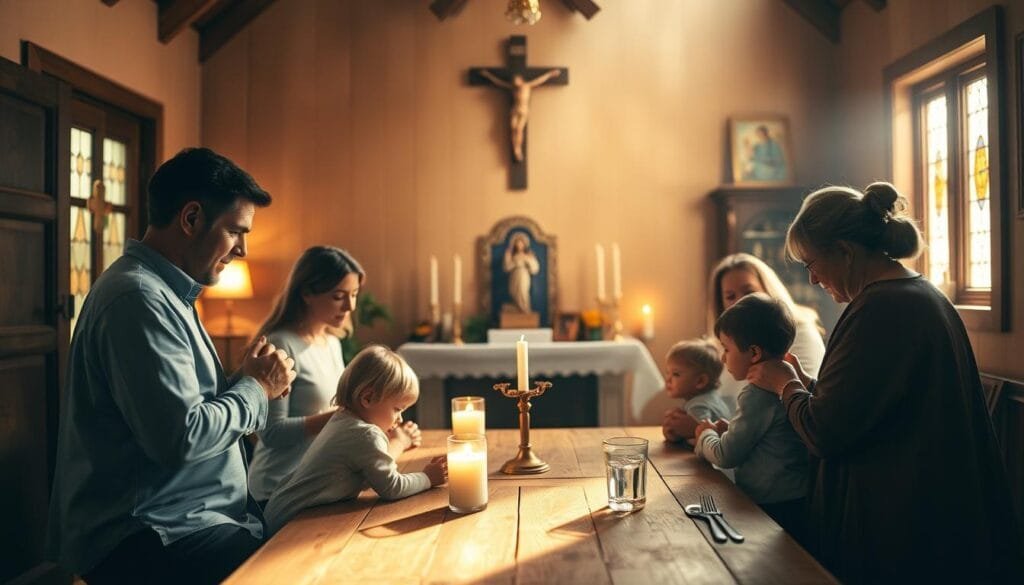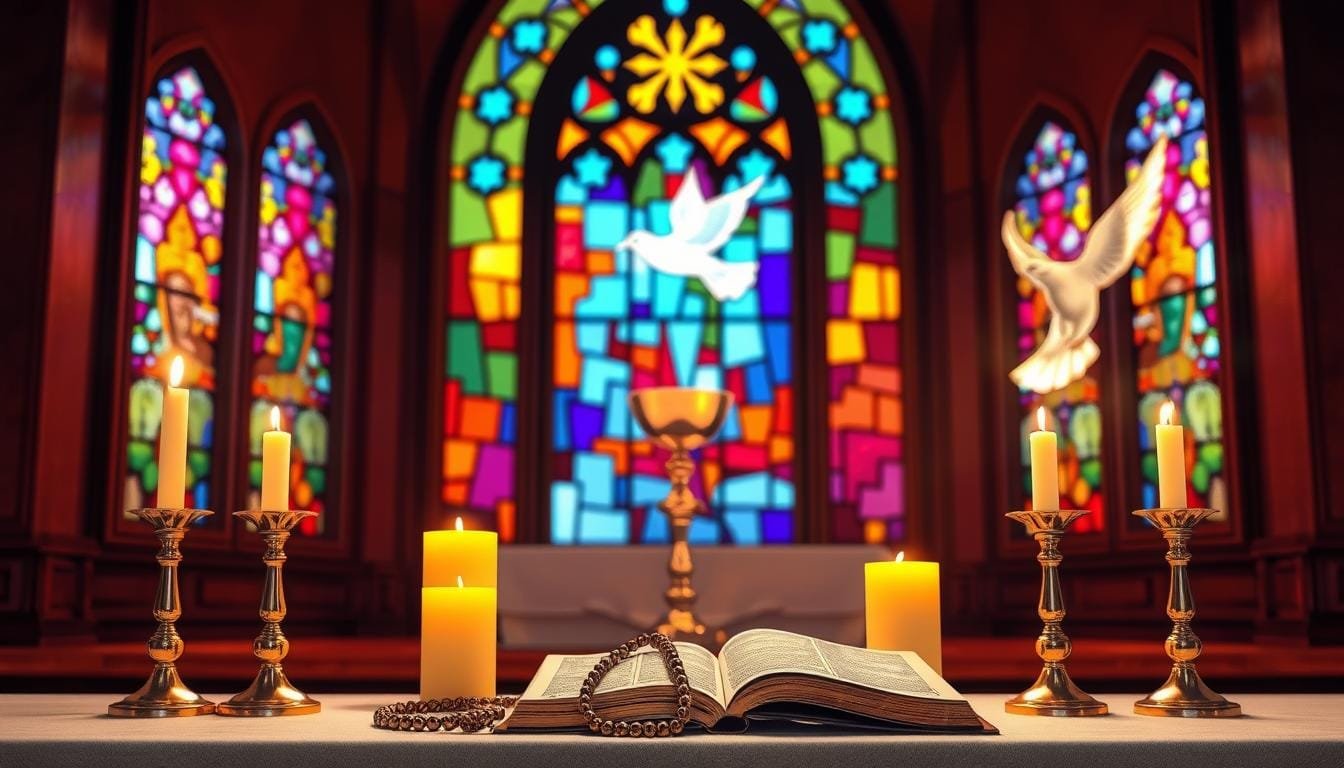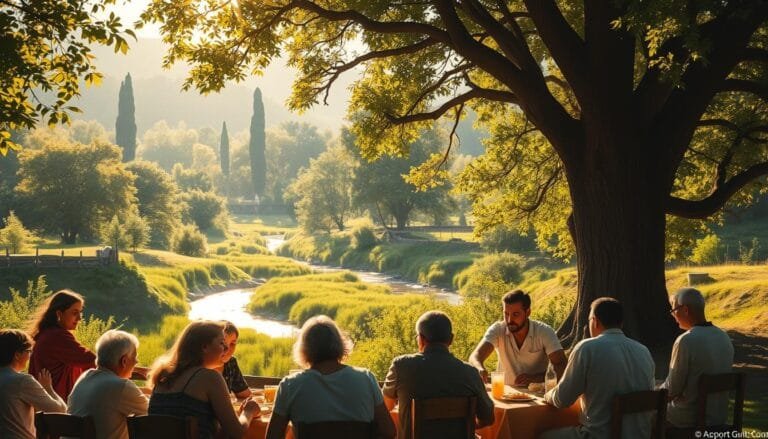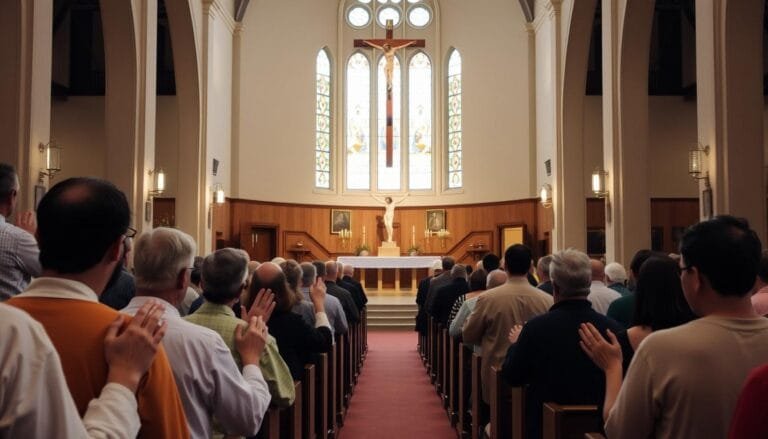Guide to Catholic Sacraments of Initiation
This website contains affiliate links. As an Amazon Associate, I earn from qualifying purchases. The content on this website was created with the help of AI.
What if your rituals could deepen your connection with God and your faith community?
The Catholic sacraments of initiation—baptism, Confirmation, and Eucharist—are more than just milestones.
They are transformative encounters with God’s grace. Rooted in Church teaching, these sacraments form the core of Christian initiation, guiding us toward holiness.
Through water, oil, bread, and wine, we become part of Christ’s body. We are nourished and strengthened to live out our faith.
Key Takeaways
- The three sacraments of initiation—Baptism, Confirmation, and Eucharist—are essential to sacramental life.
- Baptism regenerates us through water and the Word, freeing us from sin and welcoming us into the Catholic faith.
- Confirmation deepens our bond with the Church, empowering us to live out our faith boldly.
- The Eucharist sustains Catholics as the source and summit of Christian life, uniting us to Christ and one another.
- Initiation is a communal journey requiring the faith community’s support from preparation to celebration.
Understanding the Sacraments of Initiation in the Catholic Faith
The sacraments of initiation are at the heart of our faith. They are Baptism, Confirmation, and Holy Eucharist.
These sacraments invite us into sacramental unity with Christ and the Church. They give us sacramental grace that shapes our divine life in Christ.
The Theological Foundation of Initiation Sacraments
These sacraments are rooted in Christ’s redemptive work. They were given to us by Jesus himself. They are not just symbols but powerful channels of God’s grace.
When we celebrate Baptism, we enter a new life in Christ. Confirmation seals this commitment with the Holy Spirit’s power.
The Eucharist sustains us with Christ’s divine life. Together, they form the foundation of our faith as outlined in Catholic tradition.
How the Three Sacraments Work Together
These sacraments are interconnected like steps on a ladder leading to a deeper union with God. Here’s how they collaborate:
- Baptism washes away sin and unites us to Christ’s body.
- Confirmation empowers us to live boldly as witnesses.
- Eucharist becomes our spiritual nourishment, uniting us to Christ’s sacrifice.
“The sacraments of initiation bring us to Christ’s full stature,” says the Catechism of the Catholic Church. This sacramental unity helps us grow in holiness.
The Order and Timing of Reception
Traditionally, the order follows Baptism first, followed by Confirmation and Eucharist.
Recent changes in some dioceses, such as the Diocese of Tulsa, now align Confirmation and Eucharist together at age 8 (third grade). Below is a snapshot of current practices:
| Sacrament | Typical Age | Purpose |
|---|---|---|
| Baptism | Infant/early childhood | Entry into the Church |
| Confirmation & Eucharist | Third grade | Full initiation into the faith community |
Parishes guide families through this journey, ensuring sacramental grace flows naturally into daily life.
As emphasized in CCC 1656, parents and godparents play key roles in nurturing this faith journey.
Baptism: The Gateway to Christian Life
Baptism is at the heart of our faith, welcoming us into God’s family. It washes away original sin, making us God’s children.
Every part of the ritual has deep meaning, leading us to a grace-filled life.
| Symbol | Meaning |
|---|---|
| Baptismal font | Life-giving waters renewing us in Christ |
| White garment | Clothing in Christ’s purity and holiness |
| Paschal candle | Light of Christ shining in the darkness |
During the ceremony, parents and sponsors make baptismal promises for infants. These vows promise to reject evil and follow Jesus.
For older children or adults, the journey involves deeper reflection on these promises. The postures used during these vows connect us to ancient traditions, strengthening our faith.
- White garments symbolize new life in Christ
- The paschal candle’s flame reminds us of eternal light
- Baptismal promises form the foundation of our faith journey
Every detail is important: the water, the white garment, and the paschal candle’s light. They remind us that baptism is a lifelong call to holiness.
As we embrace these symbols, we join the community of believers on our journey to eternal life.
The Sacrament of Confirmation: Strengthening Faith
Confirmation is when Catholics are sealed with the Holy Spirit to be bold witnesses of Christ. It deepens our bond with God’s grace and gives us spiritual gifts to share our faith.
The sacred chrism anointing shows this divine power, uniting us with the Church’s mission.
The Gifts of the Holy Spirit
The seven gifts help us grow in faith: wisdom, understanding, counsel, fortitude, knowledge, piety, and fear of the Lord.
These spiritual gifts give us courage to face life. For example, fortitude helps us stay strong in faith, and wisdom guides our moral choices. Each gift is a tool for living as disciples.
The Catechism of the Catholic Church teaches: “Confirmation roots individuals more deeply in divine filiation, increases the gifts of the Holy Spirit, and strengthens their bond with the Church.”
Choosing a Confirmation Name and Sponsor
Choose a Confirmation name of a saint who inspires you. Your Confirmation sponsor must be a confirmed Catholic over 16. They support your faith journey and are a spiritual mentor.
Preparation Requirements for Confirmation
- Catechesis sessions on the sacrament and the Holy Spirit’s role
- Service projects to live the Gospel
- Retreats for reflection and community
- Audience with the bishop to renew baptismal promises
Age of Reception Across American Dioceses
| Diocese | Age | Order of Sacraments |
|---|---|---|
| Diocese of Fargo | 3rd grade | Baptism → Confirmation → Eucharist |
| Traditional dioceses | 14–16 years | Baptism → Eucharist → Confirmation |
| Eastern Rites | Infants | All three sacraments in one ceremony |
Dioceses have different practices, but the goal is to empower believers to be lifelong witnesses. Confirmation is a call to grow in faith and service.
May this sacrament inspire you to live with the Holy Spirit’s strength and be Christ’s light in the world.
First Holy Communion and the Eucharist
The Eucharist is at the heart of our faith, inviting us to meet Christ’s Real Presence. Let’s explore its mysteries and learn how to fully embrace this sacrament.

Understanding Transubstantiation
Transubstantiation is when bread and wine become Christ’s Body and Blood. Their look stays the same, but their essence changes.
This change is a miracle, not something we can do. The Church says we get the fullness of Christ’s sacrifice at Holy Communion.
“The Eucharist is the source and summit of the Christian life.” — Catechism of the Catholic Church
Preparing Children for First Communion
Good First Communion preparation includes:
- Two years of faith formation starting in first grade
- Receiving First Reconciliation before Holy Communion
- Family rituals like praying the rosary or attending Mass together
Kids usually celebrate this big moment at the ages of 7-8 in the second grade. Adults preparing through RCIA have a journey tailored just for them.
The Eucharist as Ongoing Nourishment
| First Communion | Ongoing Eucharistic Life |
|---|---|
| First encounter with Christ’s Real Presence | Weekly Mass attendance |
| Celebration with family and parish | Practices like Eucharistic adoration |
After First Communion, Catholics deepen their bond with Christ. Eucharistic adoration is a special time to pray before the Blessed Sacrament, helping us get closer to Christ.
Let’s approach the Eucharist with deep respect. It’s more than a meal—it’s life itself. Holy Communion calls us to grow in love for God and others.
Historical Development of the Sacraments of Initiation
The early Church celebrated Baptism, Confirmation, and Eucharist together. These sacraments were seen as one journey of faith.
Adult converts were welcomed into the faith through the Easter Vigil rituals.
Over time, the East and West developed different practices. Here are some key differences:
- Eastern Churches kept the tradition of uniting all three sacraments for everyone, even infants.
- In the West, Baptism became a rite for infants. Confirmation and Eucharist were given later, in childhood or adolescence.
Vatican II brought back the RCIA process for adults. This move highlighted the unity of the sacraments in Christian living. The Catechism says:
“Confirmation perfects Baptismal grace and strengthens the bond with the Church.”
This wisdom shows us that each sacrament is part of a single journey.
Today, our practices include both old and new. The Western Church’s timeline for sacraments changed, but its purpose remained unchanged.
The 1983 Code of Canon Law lets bishops decide when to give Confirmation to children between 7 and 16 years old. This shows the Church’s care for families and its respect for tradition.
Understanding our heritage helps us see the value of Vatican II reforms. These reforms brought back ancient practices while respecting local traditions.
As we look at liturgical history, remember that sacraments are not just rituals. They are living expressions of God’s love.
The Role of Parents and Godparents in Sacramental Preparation
The domestic church, or the family, is at the center of faith formation. Parents teach their children about faith through daily prayers, attending Mass, and sharing stories of God’s love.
Catholic parenting is about making the sacraments a part of everyday life, not just learning about them.
“Parents are the first heralds of the living God and the first catechists of the faith.” – Catechism of the Catholic Church, 2221
Godparents have big responsibilities that go beyond baptism. They should live out their faith and guide children through life’s ups and downs.
They also celebrate important moments like First Communion and Confirmation. Their role in sacramental preparation starts long before the sacrament.
- Choose godparents who are practicing Catholics (age 16+), confirmed, and in good standing with the Church.
- Engage in parish-led sacramental programs while deepening family rituals like grace before meals or bedtime prayers
- Encourage godparents to pray with the child regularly and attend key sacramental milestones
Parish programs are important but don’t replace the family’s role. When picking godparents, choose those who are active in their faith.
Small acts of faith every day help children understand and appreciate the sacraments.
Parents and godparents work together to guide young hearts to Christ. This partnership is like the Church’s mission to “go and make disciples” but starts at home.

Special Circumstances in Receiving the Sacraments
The Catholic Church welcomes everyone on their journey to grace.
It ensures that no one is left out of sacramental life, including those who convert as adults, receive sacraments later, or face unique challenges.
RCIA: The Path for Adult Converts
The RCIA process helps adults join the Church. It has stages like Inquiry, Purification, and Enlightenment, which help deepen faith before receiving sacraments.
Adults often join the Church at the Easter Vigil. This is when catechumens and candidates are welcomed.
Delayed Sacraments
Children who receive sacraments later are prepared with care. Parishes offer special programs for them so they feel valued and not left behind.
Parents and parishes work together. They make sure children feel loved and prepared.
Accommodations for Persons with Disabilities
Sacraments are for everyone, including those with disabilities. Parishes have sign language, large-print materials, and safe spaces to ensure everyone can participate.
Those with special needs can get Confirmation and Eucharist. They just need to know the difference between the Eucharist and regular food.
Emergency Baptism
Anyone can baptize in emergency situations. Using water and the right words can save lives when there’s no time.
The Church’s sacraments show Christ’s love for all and offer a way for everyone to find grace in their own time and way.
Conclusion: Living Out the Graces of Initiation
Our journey in the Catholic faith begins with baptism, confirmation, and Eucharist. We are called to live out these graces in every part of our lives.
The sacraments are not just rituals but powerful tools for our spiritual and faith growth.
Since the early days of the Church, these sacraments have been celebrated together. Although practices have changed, their purpose remains the same.
The Diocese of Fargo’s changes in Confirmation timing show our commitment to living these sacraments fully.
Mystagogy, or the time after initiation, helps us reflect on our baptismal call. It teaches us about the power of Confirmation and the nourishment of the Eucharist.
Resources like the Catholic 10 Commandments for Kids can spark important conversations about living our faith.
St. Thomas Aquinas reminds us that Baptism is just the start. Let’s use the graces we’ve received by praying, attending sacraments, and doing acts of mercy.
Our journey is not just about personal growth but also about changing the world for the better.






